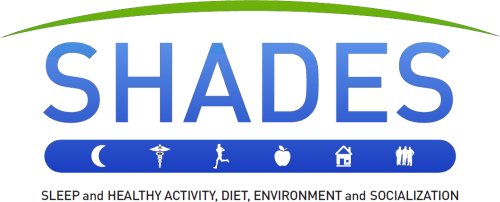
Nogales Cardiometabolic Health and Sleep (NoCHeS) Study
This study is funded by the National Institute on Minority Health and Health Disparities of the National Institutes of Health (R01MD01160). This project aims to understand sleep health at the US-Mexico border, the social, behavioral, and environmental factors that play a role in sleep health in this region, and the impacts of sleep on risk for cardiovascular disease and diabetes. This study will enroll about 1,100 people from the Nogales, AZ area. This study is being conducted in partnership with the Mariposa Community Health Centers and the promotoras de salud program.
We will be recruiting for this study soon. If you are interested in learning more, reach out to us.
A full website for the NoCHeS Study is in development and will be launched Fall 2018.

Cardiometabolic Health And Relationships To Sleep (CHARTS Study)
This study is funded by the National Heart, Lung and Blood Institute at the National Institutes of Health (K23HL110216). The overall aim of this observational study is to evaluate whether habitual short sleepers (6 hours or less) differ from 7-8 hour sleepers in terms of cardiovascular and metabolic function. Other domains are assessed as well, including sleepiness, performance, behavior, and psychological functioning. This study includes (1) an online survey, (2) an intake exam, (3) home sleep testing, (4) 2-week home monitoring, and (5) 3-night in-lab study. Data analysis is ongoing.

Investigational Test of a New Sleep Supplement (InTeNSS) Study
This study is funded by Kemin Industries. The overall goal of this study is to test a new nutritional ingredient (which could one day be used in supplements and foods) regarding its effects on sleep. Preliminary evidence suggests that this compound (which comes from spearmint) could improve sleep, but we are going to perform a study to see (1) what effects this has on sleep, and (2) how these effects are likely experienced. Recruitment will begin soon. Contact us if you are potentially interested in joining this study.

The Arizona / Nexalin Substance Use Recovery (ANSUR) Study
This study is funded by Nexalin Technology. This is a test of whether a device that emits an electrical current to the brain (currently in use to treat a wide variety of conditions) can improve the sleep and mental well-being of patients in a substance abuse treatment program. Often, these individuals have disturbed sleep, mood, and pain. This study tests whether this device can (1) improve sleep in these individuals, (2) improve other domains such as mood and pain, and (3) improve substance use outcomes. This study is currently underway.

Project REST: Recovery Enhancement and Sleep Training
This study is funded by the National Collegiate Athletics Association (NCAA). This project consists of a survey, to be completed by student athletes returning to campus, and a peer-driven sleep health program that will use education, tracking, and technology to potentially improve the health and well-being of student athletes through improved sleep.

Athlete Sleep Heart Screening Study
This study is funded by the Steven M. Gootter Foundation, a leading voice in preventing Sudden Cardiac Death. This project will include three parts, with the goal of better understanding links between sleep and SCD. Dueing this study, we will partner with UA Athletics, who already performs screening electrocardiograms on all incoming athletes (who are a higher-risk group for cardiac abnormalities). We will add some sleep assessments to this protocol. Further, we will compare the sleep of those flagged with an abnormal reading and those that are not. Finally, we will expand our scope beyond athletes and examine relationships between sleep and traditional SCD risk factors in a very large population sample using CDC data.

Sleep and Healthy Activity, Diet, Environment, and Social Factors (SHADES Study)
This study is funded by the National Institute of Environmental Health Sciences at the National Institutes of Health (R21ES022931). The overall aim of this study is to characterize the social, environmental, and behavioral determinants of habitual short sleep duration. This study includes (1) a population-based survey of the Philadelphia area, (2) geospatial mapping of survey data superimposed with existing neighborhood-level data, and (3) a 2-week in-depth home monitoring study. Data collection is ongoing.

Sleep and Health in the American Population
Read more about our work in this area.
Secondary analysis of population-wide data for the purpose of characterizing sleep problems in the general population, as well as identify disparities in sleep health and examine relationships among these disparities and other health outcomes. More specifically, predictors of sleep disturbance from the sociodemographic domain (e.g., gender, age, ethnicity, income, education, marital status, employment), mental health (e.g., depression, anxiety, quality of life) and health (e.g., heart disease, diabetes, stroke, smoking, exercise, alcohol use) are being investigated. Analyses ongoing.
Current projects utilizing the Behavioral Risk Factor Surveillance System (BRFSS) include: (1) Disparities in sleep disturbance associated with race/ethnicity and socioeconomics [published], (2) Sleep disturbance and obesity, diabetes and exercise [published], (3) Sleep disturbance and cardiometabolic disease [published], (4) Sleep disturbance and daytime tiredness decrease with age [published], (5) Sociogeographic correlates of sleep disturbance [published], (6) Perceived racism and sleep disturbance [published], (7) Sleep duration versus sleep insufficiency [published], (8) Social and behavioral determinants of sleep insufficiency [submitted], (9) Spatial analysis of sleep insufficiency by county [in preparation], and others.
Current projects utilizing the National Health and Nutrition Examination Survey (NHANES) include: (1) Sleep duration and C-reactive protein [published], (2) Sleep symptoms and dietary intake [published], (3) Sleep duration and dietary intake [published], (4) Disparities in sleep symptoms relative to demographics and socioeconomics [submitted], (5) Disparities in sleep duration [in preparation], (6) Sleep symptoms and metabolic syndrome [submitted], (7) Insomnia and cardiometabolic risk factors [submitted], and others.